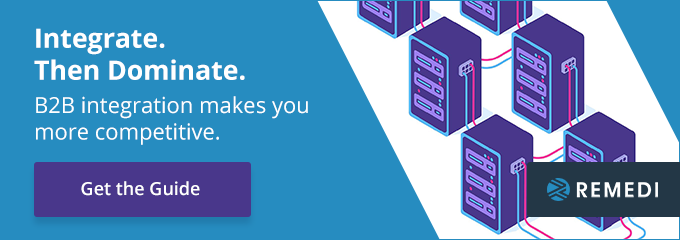
When you think about hosted EDI, the first thing that comes to mind is the “where.” Where will the EDI solution be hosted? Typically, the debate has been cloud vs. on-premises EDI.
However, the discussion about hosted EDI shouldn’t focus on where – it should focus on how. Read on to learn why hybrid EDI services can strengthen businesses. Are You Ready to integrate?
What Are Hybrid EDI Services?
To understand what hybrid EDIis, let’s take a moment to look at two other EDI options:
- On-premises
- Cloud
On-Premises
On-premises EDI means that integration software is installed on a server located at an organization’s facility.
Cloud
Cloud EDI comes in three flavors:
- Private cloud – integration software is installed in a full-service data center off-site.
- Public cloud – integration software is installed in a self-service data center off-site.
- Integration Platform-as-a-service (IPaaS) – integration capabilities via multi-tenant software through a subscriber model delivered via a self-service web interface from an off-site data center
Hybrid EDI refers to integration software that’s a mix of the two delivery approaches mentioned above.
Why Choose Hybrid EDI Services
How do you know if a hybrid EDI model is right for you? Here are some benefits businesses typically enjoy with this approach:
- Product capability extensibility
- Rapid development and deployment
- Easier code maintenance and upgrades
- Support for a bridge-to-the-cloud strategy
- Portability
- Supply chain and process visibility
Focusing on the “How” Rather Than the “Where”
Hybrid EDI shifts the discussion of where you should host integration software to how you should host integration software. In fact, we believe that the how of hosting is actually more important than the where.
Here’s why: when you only think about where your EDI software will be hosted, you miss out on some important considerations, such as:
- Who has control over the data
- How quickly a service provider will respond if there’s a glitch
- Regulatory issues – can data be stored in a public cloud?
Hybrid EDI services help companies avoid those problems thanks to their flexibility. For example, you can host sensitive data on-site to maintain control over it; less-sensitive information, or information for clients facing lower regulatory burdens, can be stored in a public cloud.
Why Now Is the Time to Consider Hybrid EDI Services
You’ve probably heard the aphorism “no time like the present,” but there really isn’t a better time than now to shift to hybrid EDI services.
If on-premises EDI or cloud EDI services don’t completely meet your needs, hybrid EDI services offer the best of both worlds. It gives you the control and the flexibility you need; you control your most sensitive data to avoid regulatory and security risks while storing other information in a public cloud means you can focus on your business.
“There is no better time than now to shift to hybrid EDI services."
EDI hosting isn’t the binary of cloud vs. on-premises EDI – it’s more nuanced than that. Hybrid EDI services offer another viable option for many companies who want to avoid risk and maximize flexibility. Integrate. Then Dominate.




